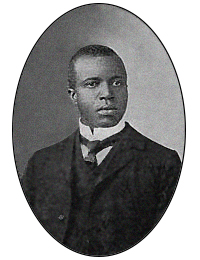Scott Joplin
| Scott Joplin | |
|---|---|

Scott Joplin in June 1903. This picture also appears on the cover of "The Cascades" from 1904.
|
|
| Background information | |
| Birth name | Scott Joplin |
| Born |
c. late 1867 or early 1868 (tombstone says November 24, 1868) Northeast Texas, U.S. |
| Origin | Texarkana, Texas |
| Died | April 1, 1917 (aged 49) New York City |
| Genres | Ragtime, march, waltz |
| Occupation(s) | Composer, pianist, music teacher |
| Instruments | Piano, cornet, guitar, mandolin, violin, banjo, vocals |
| Years active | 1895–1917 |
Scott Joplin (/ˈdʒɒplɪn/; c. 1867/68 – April 1, 1917) was an African-American composer and pianist. Joplin achieved fame for his ragtime compositions and was dubbed the "King of Ragtime Writers". During his brief career, he wrote 44 original ragtime pieces, one ragtime ballet, and two operas. One of his first pieces, the "Maple Leaf Rag", became ragtime's first and most influential hit, and has been recognized as the archetypal rag.
Joplin was born into a musical family of railway laborers in Northeast Texas, and developed his musical knowledge with the help of local teachers. Joplin grew up in Texarkana, where he formed a vocal quartet, and taught mandolin and guitar. During the late 1880s he left his job as a laborer with the railroad, and travelled around the American South as an itinerant musician. He went to Chicago for the World's Fair of 1893, which played a major part in making ragtime a national craze by 1897.
Joplin moved to Sedalia, Missouri, in 1894 and earned a living as a piano teacher; there he taught future ragtime composers Arthur Marshall, Scott Hayden and Brun Campbell. Joplin began publishing music in 1895, and publication of his "Maple Leaf Rag" in 1899 brought him fame. This piece had a profound influence on subsequent writers of ragtime. It also brought the composer a steady income for life, though Joplin did not reach this level of success again and frequently had financial problems. In 1901 Joplin moved to St. Louis, where he continued to compose and publish music, and regularly performed in the St. Louis community. The score to his first opera A Guest of Honor was confiscated in 1903 with his belongings because of a non-payment of bills, and is now considered lost. He continued to compose and publish music, and in 1907 moved to New York City to find a producer for a new opera. He attempted to go beyond the limitations of the musical form that made him famous, without much monetary success. His second opera, Treemonisha, was not received well at its partially staged performance in 1915.
...
Wikipedia
